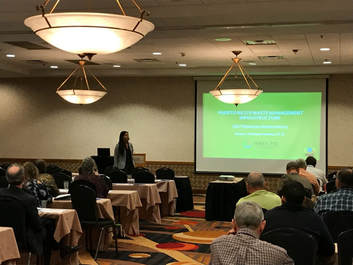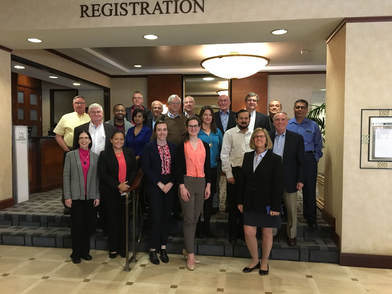IEMES, P.S.C.
Right choices today for a better tomorrow.
Right choices today for a better tomorrow.
 Hanna Rodriguez, PE, SC from our team was invited to present at the 2018 SWANA Arkansas Chapter Annual Conference last April 4, 2018. A waste management summary prior to the 2017 Hurricane Season was provided to participants. Such summary included, legal background including regulatory provisions, landfill closure orders, and a general sense of stakeholders involved in setting forth a comprehensive and reliable Integrated Solid Waste Management (ISWM) System. Further, a glimpse at a risk analysis performed by Ms. Rodriguez and Ms. Carmen M. Figueroa-Santiago, PE, SC was provided. This analysis, finalized in August 2017, was based on the island’s waste management infrastructure as a key step in adaptation towards climate change resilience. A scientific approach described in the International Organization for Standardization’s document ISO 31000 Risk management – Principles and guidelines was adapted and used. Additionally, adjustments and base assumptions designed for the PR Climate Change Council (PRCCC) infrastructure evaluation sub-committee led by the Assistance in Natural Disaster Management Commission (“CAMDN”, per its Spanish acronym) of the PR Professional College of Engineers (“CIAPR”, per its Spanish acronym) were considered. This risk assessment provided an overview of crucial issues to be encountered in the future and were exalted by the 2017 Hurricane Season. The 2017 Hurricane Season, highlighted by Hurricane Irma and Maria’s impact to Puerto Rico and the USVI, was an unusually active one. Summarizing first response efforts to ongoing debris management, Ms. Rodriguez provided a general third-party perspective. The impact these events have had and will continue to have on the industry must be perceived as opportunities to avoid prolonging landfill closures and implementation of alternatives focused complying with the waste management hierarchy. Manifestations of climate change such as higher temperatures, altered rainfall patterns, and more frequent or intense extreme events are bearing an even heavier burden on our industry, in particular in the already struggling Caribbean islands. In conclusion to this presentation, Ms. Rodriguez reiterated the need to understand these impacts. It is widely known that solid waste management infrastructure is critical to maintain sanitary conditions, hence the importance of designing and maintaining systems and infrastructure resilient to climate change. To this point, our team looks forward to upcoming opportunities where our expertise is necessary for developing SMART goals, as well as resilient and sustainable solutions for the island and the Caribbean Region.  A very special and personal appreciation to Mrs. Wendy Bland, current Director at Benton County Solid Waste District and International Board Representative of the SWANA Arkansas Chapter, for the introduction. Finally, to the generous SWANA Chapter Board for their invitation and interest in the topics presented and the Caribbean Region´s well-being.  by Carmen M. Figueroa, SC, PE Houston, TX During March 20-21, 2018, the American Institute of Chemical Engineers (AIChE), held the Hurricane Disaster Infrastructure Resilience and Planning Workshop in Houston, TX, through a grant program from the United Engineering Foundation (UEF). The multidisciplinary workshop, the first of two similar events, was attended by several engineering societies, academics, professionals in the private practice, as well as industrial and public entities, all experts in disaster relief and resiliency. Representing IEMES, PSC, Eng. Carmen M. Figueroa was invited and participate providing input from her professional experience during the response and recovery period to date, after hurricanes Irma and María in Puerto Rico last September 2017. The workshop focused on identifying priority issues that engineers could address to mitigate and prevent significant hurricane damages in the future. This by stressing the need to strategically prepare for and rebuild disaster susceptible areas affected by hurricanes Harvey, Irma and Maria. Among the many issues discussed during the two-days forum, infrastructure specialists debated on matters that impacted preparedness and response after these storm events. The group identified the lack of investment in planning and preparedness for managing industrial resilience, lack of emergency planning for worst case scenarios, and the need to understand infrastructure systems, its boundaries and how they affect, as essential key issues that must be addressed promptly. What should be done then? Focus on reducing impacts through infrastructure resiliency, improve response capability by involving intergovernmental and cross-sector policies to reduce implementation challenges, and promoting the use of science and engineering expertise. We at IEMES, PSC are looking forward to attending the following workshop to be held by the end of Summer 2018. Moreover, we recognize the need and our interest in incorporating additional Puerto Rico professional and experts’ representation to this event or initiative. Our team is more than welcome to work with AIChE and UEF as local liaison for potential future events. More on the workshop: www.aiche.org/conferences/hurricane-disaster-infrastructure-resilience-and-planning-workshop/2018/technical-program-houston |
AuthorsFernando L. Rodríguez, PE, SC Archives
September 2022
Categories |
 RSS Feed
RSS Feed
